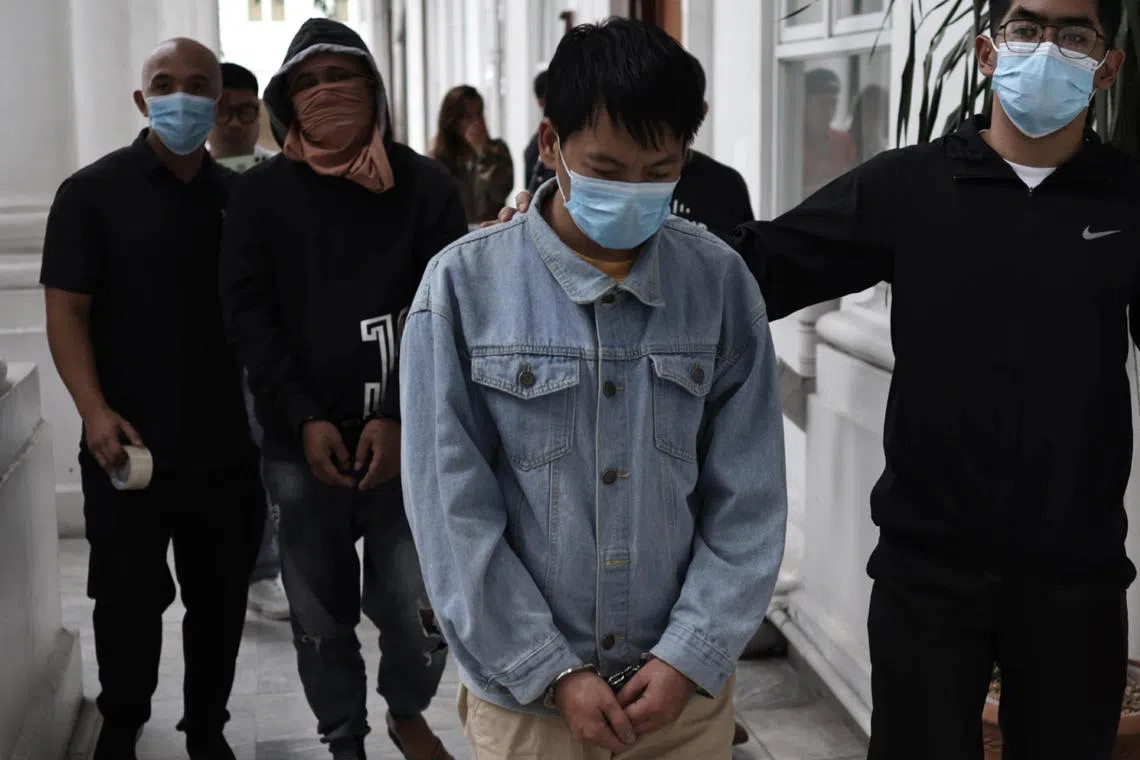Philippines eyes stricter anti-spy laws as fears of foreign espionage grow
Sign up now: Get insights on Asia's fast-moving developments

Chinese national Deng Yuanqing (centre) being escorted at the Department of Justice's office in Manila, Philippines.
PHOTO: EPA-EFE
Follow topic:
MANILA – The Philippine authorities are pushing for tougher anti-espionage laws after the recent arrest of a suspected Chinese spy raised concerns over foreign intelligence threats to national security.
The government suspects China has “extensive operations” to infiltrate the Philippines’ security infrastructure as tensions mount over the South China Sea, National Security Council spokesman Jonathan Malaya said during a public forum on the sea dispute held in Manila on Jan 29.
He said the arrest of alleged Chinese spy Deng Yuanqing
Mr Malaya asked lawmakers to pass the pending Bill amending the World War II-era Espionage Act and another Bill aimed to counter foreign interference and malign operations in the country.
“These amendments are clearly very needed, given the fact we are slowly uncovering a lot of intelligence operations being done by foreign powers in the Philippines,” he said, adding that by amending the anti-espionage laws, “we will be able to complete our defence system against them (spies) because we really need good legal foundations to be able to proceed forward”.
The Philippines’ Espionage Act, enacted in June 1941, punishes spying and other offences against national security. But the anti-espionage provision applies only during times of war.
The law also punishes those convicted of spying with imprisonment of up to 10 years and a fine of up to 10,000 pesos (S$230), which Mr Malaya said would not be enough to deter espionage activities.
The pending Bills in Congress propose applying the anti-espionage provision even during times of peace. They also seek to impose heftier fines of up to one million pesos and life imprisonment for those charged under the espionage law.
Former Supreme Court associate justice Antonio Carpio also said during the forum that the Philippines needs to update and amend the Revised Penal Code, as it punishes Filipinos for committing treason only during times of war.
“So if a Filipino helps the Chinese gather information vital for our national security, he cannot be prosecuted for treason,” Mr Carpio said.
Deng and his Filipino accomplices were accused of using sophisticated equipment to map out infrastructure in strategic areas in the Philippines, including military bases that the US has access to under a defence deal with Manila.
Among the other infrastructure they mapped were power plants, petrochemical plants, substations of the National Grid Corporation of the Philippines, navigational lighthouses and a military signal frequency repeated in two provinces south of the capital Manila.
They also mapped out the resource-rich Malampaya gas field in the coastal province of Palawan, which faces the South China Sea.
When asked for comment by reporters on Deng’s arrest, the Chinese Embassy in Manila said the accusations were “baseless”. The embassy told the Philippine government to “stop airing groundless speculations about the so-called ‘Chinese spy case’” and to protect the rights of Chinese citizens in the country.
“We urge the Philippine side to base its judgment on facts (and) not to make (a) presumption of guilt,” the embassy said in a statement on Jan 25.

This handout photo received from the Philippine National Police Bicol Region on Jan 2 shows a submarine drone suspected to be from China found by fishermen off the coast of San Pascual in Masbate province.
PHOTO: AFP
Deng’s case is just the latest involving China’s alleged espionage activities that the Philippine government has publicised in the past months.
The authorities said at least five underwater drones were recovered in various parts of the country in 2024,
In late January, officials arrested two Chinese nationals caught taking cellphone videos of Philippine Coast Guard ships passing by a resort in Palawan.
The suspects denied allegations of wrongdoing, but the authorities found photos of Filipino military camps and other equipment on their devices.
The biggest espionage-related case to rock the nation is that of Alice Guo, the former mayor of a small Philippine town accused of being a Chinese spy and crime boss
Guo is now in jail after money laundering, human trafficking and graft charges were lodged against her. banned Pogos in July 2024

The biggest espionage-related case to rock the nation is that of Alice Guo, the former mayor of a small Philippine town who was accused of being a Chinese spy and crime boss.
PHOTO: COURTESY OF OFFICE OF SENATOR RISA HONTIVEROS
Officials also found alleged Chinese military uniforms and suspected espionage equipment during Pogo hub raids conducted in 2024,
She said the AFP is now investigating to “connect the dots” regarding all these activities linked to Beijing.
“We’re checking how all of these connect to the geopolitical tensions that we’re facing (with Beijing),” Col Padilla said. “We’re looking at all of these things and trying to see how all of these incidents fit into a grand plan.”
Col Padilla said the Philippine government is not targeting a specific country in the ongoing investigation but added that the evidence gathered regarding the suspected espionage activities so far can all be linked back to China.
“They will have the opportunity to defend their case in court,” she said.
Geopolitical analyst Don McLain Gill of De La Salle University in Manila told The Straits Times that it is about time the Philippines focused more on combating China’s alleged espionage activities, claiming that the latter aims to sow social discord and political destabilisation.
He said the Marcos government is now challenged to clamp down on these operations while continuing efforts to protect the country’s claims in the South China Sea.
“This would require a lot of political resource in order to make sure that the clear message is sent that the Philippines is not going to tolerate these destabilising efforts from within,” he said.
Mara Cepeda is Philippines correspondent at The Straits Times.


